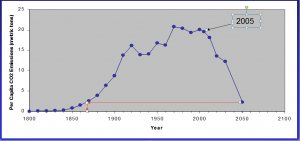President Obama’s Climate Plan makes Mayberry look Modern
It was not that long ago, that many of the modern electrical and/or electronic appliances and conveniences that the present generation takes for granted either did not exist at all or, if they did exist, that had yet to receive widespread adoption by the public either due to high prices or lack of familiarity.
There were no desk top computers, no color TV’s (much less big screen, 3d TV’s ), no ipads, ipods, iphones or any of Apple, Inc.’s, Android or Google based competitors, no server stations, cell-phones, no micro-waves, no X-Box’s, Nintendo’s or Sony play stations, no remote controls, no cd or dvd players, no electronic fuel injection, no dish washers, no electric or gasoline hedge clippers or weed-wackers — all of this any many other power hungry devices that have become common place, even vital to the modern world, simply did not exist in the 1950’s to early 1960’s. In addition, many of the devices that we use today, did exist in during the 1950’s but they weren’t common place. Most families only had a single car, there was a single phone in the house, clothes were dried on clothes lines, not dryers – which were rare –, central air was also rare and many homes and offices didn’t even have window units – theaters advertised having air conditioning as an additional attraction to go to the movie. Black and white televisions were just beginning to make inroads into the average household, but there was only one and it was in the main room. Lawn mowers were transitioning from manual push mowers to early gasoline powered models.
Watch an old episode of the Andy Griffith show, Leave it to Beaver or I Love Lucy and you’ll get a feel all the things that were absent or uncommon from the average home in the middle of the 20th Century.
This was all brought to mind when President Obama unveiled his grand climate agenda last week in a speech at Georgetown. Obama, unable to convince a skeptical Congress that the benefits of fighting purported global warming outweigh the costs, has decided to circumvent them altogether and issue administrative edicts from on high.
Many analysts have focused their critiques of the President’s climate change initiatives on the high costs that will imposed upon the economy: millions of jobs lost, much higher energy prices, jobs shipped overseas, etc… Often, however, when the numbers get this high, people’s eyes glaze over and they can’t personalize the real impact. That’s where this note comes in.
A couple of years ago, a bill was offered by Democratic Representatives Ed Markey (MA) and Henry Waxman (CA) that would have cut greenhouse gas emissions primarily generated by energy use by 16 percent below 2005 levels by 2020 and 83 percent below 2005 levels by 2050. While the President’s plan, so far, doesn’t try to impose stricter standards out to 2050, his short term standard, at 17 percent below 2005 levels by 2020 is actually a little more stringent than the Markey-Waxman standard. This standard, accounting for population growth, would cut CO2 per capita to levels not seen since the mid-1950’s.

Remember one car, one landline phone, no computers, cell phones or electronic gaming systems – so tell me, which will you live without?
It is much more serious than just giving up the luxuries that we “depend” on, we will hamper growth and regress our capabilities. We won’t be able to communicate, get vital information or trade as effectively. Wealth will stagnate and standard of living will plummet. People that would’ve been saved before will now succumb to illness resulting in serious injury and death. The argument can be made that this is good for the planet, but make no mistake, it will be horrible for the people living now.
I’m sure in the midst of this crisis, people will clamor for more government to save them.
This is the angle that needs to be more aired more often. People think that we can “save the world” and still live comfortably, that isn’t going to happen.
True. People will have to realistically ask themselves if they want to do away with most of these material amenities they’re so used to.
I think that if we’ve learned anything from our debt problem it is that people would prefer to avoid pain now and suffer worse later. This should make it easy to convince people to oppose this action.
I’m sure that important people will be paid off to convince people otherwise.
“has decided to circumvent them altogether and issue administrative edicts from on high.”
-This is a major evasion of the people’s will.
Cooper,
I agree that this seems like a political maneuver to navigate around congressional legislation, however, history has shown that all presidents have done this at some point.
You are correct, but that doesn’t make it right. We should be outraged every time this happens.
Tolley, you are right and it illustrates the way politics works in our country.
I think that Pres. Obama’s war against coal is going to backfire. People don’t like to pay high electricity.
That’s the way to combat this. When people start feeling the pain personally, they’ll demand change. Hopefully it isn’t too late by then, government does a great job of confusing culpability.
If Obama wants to cut emissions, he should block oil and gas imports and block fracking and drilling. He wouldn’t dare do it though because he knows it would tank the economy. He is all words. He promises this stuff to environmentalists and those scared of the enemy of global warming. It’s all based on emotion, not logical thinking which is a common thing for solutions from the left. His subsidizing of wind and solar is nothing more than a waste of money. They’d have a better chance of curbing emissions if they turned to the Amish for advice.